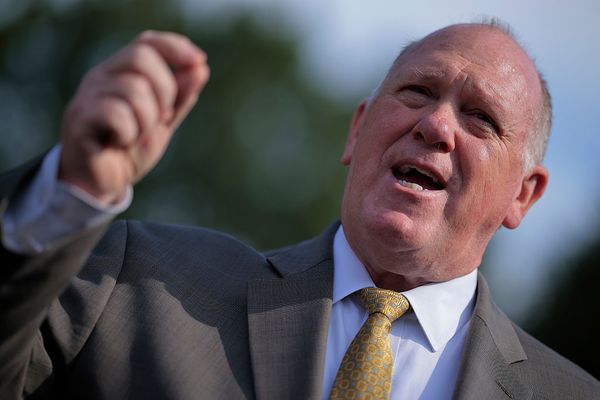
It is telling that, at the age of 55, Western Australia’s premier, Mark McGowan, cited exhaustion, rather than the fulfilment of political ambition, as the main reason for his sudden resignation.
McGowan strode into the state’s highest office in 2017, but it was his Covid response that propelled him into unprecedented power in 2021, with his party wining the most one-sided election result in Australia’s history – taking 53 of 59 seats in the lower house.
McGowan became a political rock star.
With a 91% approval rating, the premier appointed himself treasurer too, while squaring up to foes who ranged from mining billionaires to union bosses.
From someone presiding over the nation’s most commanding electoral win, and with the diminished status of the opposition – now led by the Nationals in WA – a decision to quit comes as a surprise.
“The role of political leadership doesn’t stop. It is relentless. It comes with huge responsibility, that is all-consuming, each and every day,” McGowan told a snap press conference on Monday.
Just hours later, his deputy premier, Roger Cook, declared his intention to take on the top job. The state’s transport minister, Rita Saffioti, has also thrown her hat into the ring.
While the odds are that McGowan would have walked in to a third term in 2025, University of Notre Dame political scientist Prof Martin Drum says he had reached the top and the only way was down.
“The last election was the most one-sided election result in Australian history, so there is possibly an argument that, as well as the exhaustion factor, he wanted to go out on top,” Drum says.
After 26 years in parliament, and as Labor leader for more than 11, McGowan’s career is enough to leave anyone exhausted.
Covid decision-making was a round-the-clock job and with the McGowan government controlling both houses of parliament, the premier was at the heart of all the decisions.
But while Covid was the biggest challenge, it certainly wasn’t the only one. There were meltdowns in the state’s health system, schoolteacher strikes, public housing shortages that fuelled a burgeoning homelessness crisis, an explosion of unrest in the juvenile detention system, and consecutive lawsuits from Clive Palmer.
Meanwhile, McGowan was arguably the most recognisable WA premier since Brian Burke – a political juggernaut who was the subject of TikToks and tattoos.
At the end of this week, McGowan will step down from his three roles of premier, treasurer and MP for Rockingham.
The announcement caused an outpouring of tributes on social media, and while haters weren’t difficult to find, the comments were mostly votes of thanks.
On McGowan’s Facebook page, Sue Lewis wrote: “Even though I am actually a Liberal voter I have been extremely happy and fully supportive of knowing you have been the great leader of our state. You really have done an incredible job throughout all your many roles and we are truly grateful. I fully supported all your decisions during Covid and know this was an extremely difficult time for you. Thank you Mark and God bless you and your family as you move into the next phase of your life.”
Liberal senator, Linda Reynolds, said that his resignation marked a fundamental transformation in WA’s politics.
“We will go from the politics of the single person, the cult of the personality, which has really sucked the oxygen out of the political debate in Western Australia, because it has been all about one man,” she said.
Taking a wider-angle view, the political commentator Antony Green said Anthony Albanese owed his majority government to McGowan.
For his part, the prime minister congratulated McGowan on his retirement and all he had achieved.
“Above all, Mark will be remembered for seeing the people of WA safely through one of the most challenging crises in our nation’s history. In unprecedented times, Mark always held to his convictions and always sought to do the right thing by his state.”
On Twitter, McGowan’s long-time legal adversary Clive Palmer wrote: “Goodbye @MarkMcGowanMP Goodbye”.
In August last year, the federal court found Palmer and McGowan had both defamed each other over comments made during a war of words over WA’s Covid border controls and lost mining royalties.
McGowan was ordered to pay Palmer just $5,000, while the latter was hit with a $20,000 defamation bill.
The businessman is currently suing the Australian government for $296bn, saying it is liable for a state law that prevented Palmer’s company from seeking compensation for a rejected Pilbara iron ore mining project.
Drum said there were a few contenders to take McGowan’s place, with state health minister, Amber-Jade Sanderson, who was parachuted into the demanding portfolio during the pandemic, potentially rivalling Cook and Saffioti.
She or Saffioti could become the state’s first female premier since Carmen Lawrence three decades ago.
“Some people might regard that [being the second female premier in WA] as a significant factor,” said Drum. “The overwhelming thing that people will be thinking about is who is best placed to win the next election.”







